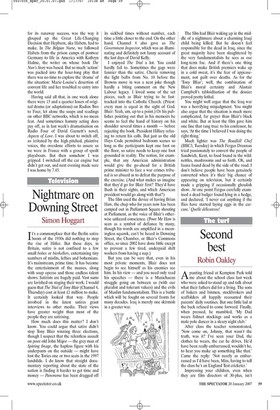Nightmare on Downing Street Simon Hoggart It's a c
Nightmare on Downing Street Simon Hoggart It's a commonplace that the Berlin satire boom of the 1930s did nothing to stop the rise of Hitler. But these days, in Britain, satire is not confined to a few small bottes or bierkellers, entertaining tiny numbers of misfits, lefties and bohemians. It's mainstream, prime time. It has become the entertainment of the masses, along with soap operas and those endless talent shows. Satirists are hugely paid. Vast sums are lavished on staging their work. I would guess that The Trial of Tony Blair (Channel 4, Thursday) cost at least £1 million to make. It certainly looked that way. People involved in the latest satires grant interviews to other media. Their views have greater weight than most of the people they are satirising.
How much does this matter? I don't know. You could argue that satire didn't stop Tony Blair winning three elections, though I suspect that the relentless assault on poor old John Major — the grey man of Spitting Image, the hapless figure with his underpants on the outside — might have lost the Tories one or two seats in the 1997 landslide. I do know that straight documentary reporting about the state of the nation is finding it harder to get time and money — Panorama has been dragged off its sickbed times without number, each time a little closer to the end. On the other hand, Channel 4 also gave us The Government Inspector, which was an illuminating and definitely not funny account of the last days of David Kelly.
I enjoyed The Trial a lot. You could hardly fail to. Sometimes the gags were funnier than the satire. Cherie removing the light bulbs from No. 10 before the Browns move in was a neat joke though hardly a biting comment on the New Labour legacy. I loved some of the set pieces, such as Blair trying to be fasttracked into the Catholic Church. (Priest: every man is equal in the sight of God. Blair: Yeah, um, up to a point.) Or his publisher pointing out that in his memoirs he seems to feel the hand of history on his shoulder several times a month — before rejecting the book. President Hillary refusing to return his calls. But just as the old Hays Code permitted bedroom scenes so long as the participants kept one foot on the floor, so satire needs to keep one foot grounded in reality. The notion, for example, that any American administration would give the go-ahead for a British prime minister to face a war crimes tribunal is so absurd as to defeat the purpose of the exercise. (And what makes us imagine that they'd go for Blair first? They'd have Bush in their sights, and which American president would go along with that?) The film used the device of having Brian Haw, the chap who for years now has been camped out in Parliament Square shouting at Parliament, as the voice of Blair's otherwise unheard conscience. (Poor Mr Haw is seen as a symbol of defiance by many, though his words are amplified in a meaningless squawk, can't be heard in Downing Street, the Chamber, or Blair's Commons office, so since 2002 have done little except to prevent a few tired, underpaid shift workers from having a nap.) But you can be sure that, even in his most private moments, Blair does not begin to see himself as his enemies see him In his view — and you need only read his speeches — there is a Manichaean struggle going on between us (with our pluralist and tolerant values) and the evils of Muslim fundamentalism. This is a battle which will be fought on several fronts for many decades. Iraq is merely one skirmish in a greater war.
The film had Blair waking up in the middle of a nightmare about a charming Iraqi child being killed. But he doesn't feel responsible for the dead in Iraq, since the great majority have been slaughtered by the very fundamentalists he sees as our long-term foe. And if there's one thing that does make British premiers wake up in a cold sweat, it's the fear of appeasement, not guilt over deaths. As for the 'Tony Bliar'; well, the combination of Blair's moral certainty and Alastair Campbell's tabloidisation of the dossier proved pretty lethal.
You might well argue that the Iraq war was a horrifying misjudgment. You might also argue that the situation is much more complicated, far greyer than Blair's black and white. But at least the film gave him one line that rang true: to his confessor, he says, 'At the time I believed I was doing the right thing.'
Much lighter was The Roadkill Chef (BBC3, Tuesday) in which Fergus Drennan tried passionately to convert the people of Sandwich, Kent, to food found in the wild: nettles, mushrooms and so forth. Oh, and fauna found dead by the side of the road. I don't believe people have been genuinely converted when it's their big chance of appearing on television, but it certainly made a gripping if occasionally ghoulish show. At one point Fergus carefully examined a dead badger found lying in a hedge, and declared, 'I never eat anything if the flies have started laying eggs in the carcase.' Quelle delicatesse!





















































 Previous page
Previous page